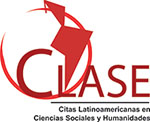Revisión Crítica sobre Tendencias en Transformadores Trifósicos de Potencia con Aislación en Gas
DOI:
https://doi.org/10.23857/dc.v7i4.2422Palabras clave:
transformador, aislante a gas, diseño, Hexafluoruro de azufre (SF6), resina epoxi fundido.Resumen
El presente artículo de revisión crítica tiene como objetivo realizar una bíºsqueda literaria referente a los transformadores aislados en gas, describiendo los elementos mós importantes, así como los hallazgos y conclusiones de diferentes investigaciones relativas al tema a lo largo del tiempo. Para este propósito, se utilizaron los motores de bíºsqueda de revistas indexadas como Semantic Scholar, ScienceDirect, Acarindex, entre otras. La metodología empleada fue de tipo bibliogrófica, la cual condujo a la selección de 25 artículos científicos, publicados entre 2017 y 2021. El anólisis de las investigaciones permitió identificar los elementos mós relevantes que sirvieron de base para el desarrollo del presente artículo. Esta bíºsqueda facilitó información para la construcción de un cuadro resumen con las evidencias encontradas, lo que orientó la discusión de resultados, resaltando el hecho que en varios países se han aplicado cambios en el diseño y construcción de transformadores con el propósito de optimizar sus niveles de factibilidad y efectividad, entre ellos la disminución en su tamaño y volumen, así como en los costos y en la posibilidad de contaminación ambiental. Algunas de las propuestas destacadas en los artículos reseñados fueron los que incorporan aislantes a base de gas, por ejemplo, el Hexafluoruro de azufre (SF6). Algunos estudios demostraron que este gas es rentable y mós ligero que el tradicional de la resina epoxi fundida, sin embargo, otros autores demuestran ciertas desventajas por lo que se sigue optimizando las investigaciones.
Citas
Ariani, H., Iskender, I., and Karakaya, M. (2020). Performance analysis of a distribution transformer using Ansys Maxwell. International Journal on Technical and Physical Problems of Engineering†(IJTPE), Iss. 45, Vol. 12, No. 4. http://www.iotpe.com/IJTPE/IJTPE-2020/IJTPE-Issue45-Vol12-No4-Dec2020/9-IJTPE-Issue45-Vol12-No4-Dec2020-pp57-62.pdf
Bal, S., Demirdelen, T., and Tí¼may, M. (2019). Three-Phase Distribution Transformer Modeling and Electromagnetic Transient Analysis Using ANSYS Maxwell. 3rd International Symposium on Multidisciplinary Studies and Innovative Technologies (ISMSIT), 1-4. https://doi.org/10.1109/ISMSIT.2019.8932953
Bermíºdez, C., y Alcocer, D. (2019). Co-simulación Magní©tica y Circuital de un Modelo de Transformador de Potencia en Software ANSYS Maxwell. 4. https://www.academia.edu/39117081
Bolotinha, M. (2018). Gas-insulated transformers. Transformers Magazine, 5(4), 100-102. https://hrcak.srce.hr/214883
Camara, N. (2020). The three-dimensional electromagnetic simulation analysis of amorphous ferromagnetic microwires. The Department of Electrical and Computer Engineering Northeastern University. https://repository.library.northeastern.edu/files/neu:m046qg27s/fulltext.pdf
Ching, W., Chien, Ch. (2021). A Novel Excitation Approach for Power Transformer Simulation Based on Finite Element Analysis. Appl. Sci. 11(21). https://doi.org/10.3390/app112110334
Di Capua, G. and Femia N. (2018) Geometric Form Factors-based Power Transformers Design. Department of Information and Electrical engineering and applied Mathematics (DIEM) University of Salerno. SMACD. 245-248. https://doi.org/10.1109/SMACD.2018.8434889
El Shafei, A., Ozdemir, S., Altin, N., Jean-Pierre, G., and Nasiri, A. (2019). A High power high frequency transformer design for solid state transformer applications. 8th International Conference on Renewable Energy Research and Applications (ICRERA), 904-909.
Guney, E., and Ozgonenel, O. (2021). An Eco-Friendly Gas Insulated Transformer Design. Energies, 14(12), 3698. https://doi.org/10.3390/en14123698
Guney, E., and Ozgonenel, O. (s. f.). R410A Gas Insulated Distribution Transformer Design. Comsol https://www.comsol.ch/paper/download/854651/ozgonenel2.pdf
Kaur, S., and Kaur, D. (2021). Finite Element Method (FEM) based Design and Simulation of Practical Transformer with Nano-Crystalline Core Using ANSYS. IOP Conference Series: Materials Science and Engineering, 1033, 012038. https://doi.org/10.1088/1757-899X/1033/1/012038
Khan, B., Saleem, J., Khan, F., Faraz, G., Ahmad, R., Rehman, N. U., and Ahmad, Z. (2019). Analysis of the dielectric properties of R410A Gas as an alternative to SF6 for high- voltage applications. High Voltage, 4(1), 41-48. https://doi.org/10.1049/hve.2018.5068
Li, X., Zhao, H., & Murphy, A. B. (2018). SF6-alternative gases for application in gas-insulated switchgear. Journal of Physics D: Applied Physics, 51(15), 153001.
Orosz, T., Poór, P., Karban, P., and Pánek, D. (2019). Power Transformer Design Optimization for Carbon Footprint. 2019 Electric Power Quality and Supply Reliability Conference (PQ) 2019 Symposium on Electrical Engineering and Mechatronics (SEEM), 1-4. https://doi.org/10.1109/PQ.2019.8818261
í–zgí¶nenel, O., and Thomas, D. (2017). Modeling and simulation of 2.5 MVA SF6-gas-insulated transformer. Turkish Journal of electrical engineering & computer sciences, 25(4), 3475-3485.
í–zgí¶nenel, O., Thomas, D., and Kurt, íœ. (2018). SF6 gas-insulated 50-kVA distribution transformer design. Turkish Journal of electrical engineering & computer sciences, 26(4), 2140-2150.
í–zí¼pak, Y., Halil, I., and Mehmet, S. (2021). Analysis of electronic circuit transformer with experimental and finite elements. International Journal of Energy Applications and Technologies 8(1). https://dergipark.org.tr/tr/download/article-file/1537417
Patel, D., Chowdhury, A., and Vallabhbhai, S. (2020). Design and Analysis of Sen Transformer Using FEM and No Load Loss Calculation. Mathematical Modelling of Engineering Problems, 7. https://doi.org/10.18280/mmep.070321
Paz, M. (2020). Estudio documental sobre Innovación educativa: Nuevos retos y perspectivas. Polo Del Conocimiento, 5(12), 465–487. https://doi.org/10.23857/pc.v5i12.2070
Qi, B., Zhao, X., Zhang, S., Huang, M., and Li, C. (2017). Measurement of the electric field strength in transformer oil under impulse voltage. IEEE Transactions on Dielectrics and Electrical Insulation, 24(2), 1256-1262. https://doi.org/10.1109/TDEI.2017.006252
Saldívar, J. (2018). Estudio de niveles de eficiencia en transformadores de distribución en función del perfil de carga. [Tesis de posgrado, Tecnológico de Monterrey]. https://repositorio.tec.mx/handle/11285/632565
Song, X., Xiaoxing, Z., Ju, T., and Siqi, L. (2018). A review on SF6 substitute gases and research status of CF3I gases. Energy Reports 4. https://doi.org/10.1016/j.egyr.2018.07.006
Srikanta, M., Azis, N., Jasni, J., Othman, M., Mohd, Y., and Talib, M. (2020) Extraction of winding parameters for 33/11 kV, 30 MVA transformer based on finite element method for frequency response modelling. PLoS ONE 15(8): e0236409. https://doi.org/10.1371/journal.pone.0236409
Taha, I, Dessouky, S., and Ghaly, R. (2020). Enhanced partial discharge location determination for transformer insulating oils considering allocations and uncertainties of acoustic measurements. Alexandria Engineering Journal 59, 4759–4769. https://doi.org/10.1016/j.aej.2020.08.041
Urooj, Sh., Singh, T., Amir, M., and Tariq, M. (2020). Optimal Design of Power Transformer with Advance Core Material using ANSYS Technique. Vol 4 No 5. https://doi.org/10.24018/ejece.2020.4.5.249
Zhang, Z.; Zhang, X.; Fu, W.; Yan, H.; Liu, F.; and Zhou, Q. (2021) Raman Spectra of SF Decomposed Characteristic Products Based on Density Functional Theory. Journal of Nanoelectronics and Optoelectronics, Volume 16, Number 2. https://www.ingentaconnect.com/contentone/asp/jno/2021/00000016/00000002/art00011?crawler=true&mimetype=application/pdf
Descargas
Publicado
Cómo citar
Número
Sección
Licencia
Derechos de autor 2021 Renón Zambrano, Yolanda Llosas, Manuel S. Alvarez-Alvarado

Esta obra está bajo una licencia internacional Creative Commons Atribución 4.0.
Authors retain copyright and guarantee the Journal the right to be the first publication of the work. These are covered by a Creative Commons (CC BY-NC-ND 4.0) license that allows others to share the work with an acknowledgment of the work authorship and the initial publication in this journal.







